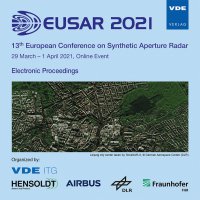Towards SAR Tomographic Inversion via Sparse Bayesian Learning
Conference: EUSAR 2021 - 13th European Conference on Synthetic Aperture Radar
03/29/2021 - 04/01/2021 at online
Proceedings: EUSAR 2021
Pages: 6Language: englishTyp: PDF
Authors:
Qian, Kun (Technical University of Munich, Munich, Germany)
Wang, Yuanyuan; Zhu, Xiaoxiang (Technical University of Munich, Munich, Germany & German Aerospace Center, Wesslinng, Germany)
Abstract:
SAR tomographic inversion (TomoSAR) has been widely employed for 3-D urban mapping. TomoSAR is essentially a spectral estimation problem. Existing algorithms are mostly based on an explicit inversion of the SAR imaging model, which are often computationally expensive for large scale processing. This is especially true for compressive sensing based TomoSAR algorithms. Previous literature showed perspective of using data-driven methods like PCA and kernel PCA to decompose the signal and reduce the computational complexity of parameter inversion. This paper gives a preliminary demonstration of a new data-driven TomoSAR method based on sparse Bayesian learning. Experiments on simulated data show that the proposed method significantly outperforms the previously proposed PCA and KPCA methods in estimating the steering vectors of the scatterers. This gives us a perspective of using data-drive approach or combining data-driven and model-driven approach for high precision tomographic inversion for large areas.


